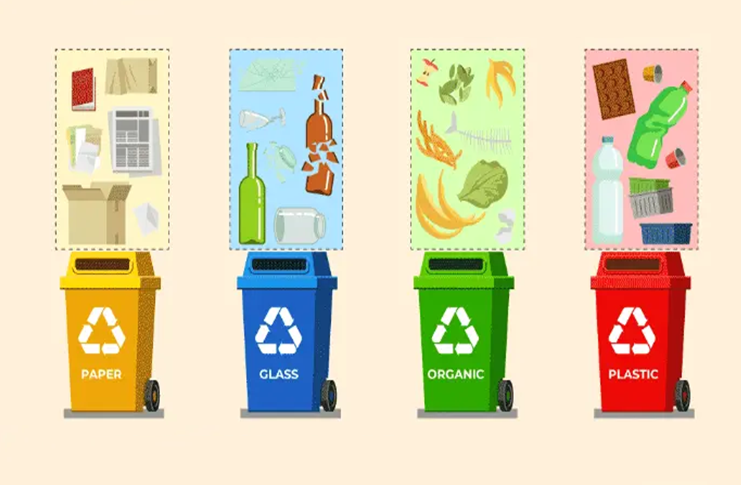Solid Waste Management

What is solid waste management? Types, methods, and its effects
Solid waste management refers to the systematic collection, transportation, disposal, recycling, and monitoring of solid waste generated by human activities. The goal is to minimize the adverse environmental impact while efficiently managing the waste generated. Solid waste includes a variety of materials such as household garbage, industrial waste, construction and demolition debris, agricultural waste, and more.
Types of Solid Waste:
Municipal Solid Waste (MSW):
This is commonly known as household waste and includes items like food scraps, packaging, clothing, and other materials discarded by households.
Industrial Solid Waste:
Generated by manufacturing processes and industries, this waste includes materials like chemicals, scrap metal, and other by-products of industrial activities.
Commercial Solid Waste:
Arises from commercial establishments, such as offices, restaurants, and shops, and includes items like paper, packaging, and other waste generated during business operations.
Construction and Demolition Debris:
Generated during construction, renovation, and demolition activities, this waste includes materials like concrete, wood, metals, and other construction-related debris.
Hazardous Waste:
Includes materials that pose a threat to human health or the environment due to their toxic, flammable, corrosive, or reactive nature. Examples include chemicals, batteries, and certain electronic waste.
Methods of Solid Waste Management:
Landfilling:
Disposing of waste in designated landfills, which are engineered sites designed to minimize environmental impact and prevent contamination.
Incineration:
Burning waste at high temperatures to reduce its volume and generate energy. This method is used for some types of waste but concerns about air pollution and the release of harmful emissions have led to the development of cleaner incineration technologies.
Composting:
Treating organic waste, such as food scraps and yard waste, through a natural decomposition process, producing nutrient-rich compost that can be used as a soil conditioner.
Recycling:
Collecting and processing materials like paper, glass, plastics, and metals to produce new products. Recycling helps conserve resources, reduce energy consumption, and decrease environmental impact.
Waste-to-Energy (WTE):
Generating energy from the combustion of waste. This method is considering a form of sustainable waste management, as it can produce electricity or heat while reducing the volume of waste.
Effects of Inadequate Solid Waste Management:
Environmental Pollution:
Poor waste management can lead to soil, air, and water pollution, impacting ecosystems and human health.
Health Risks:
Improper disposal of waste can result in the spread of diseases through contaminated water and air, affecting both human and animal populations.
Resource Depletion:
Inefficient waste management contributes to the depletion of natural resources, as materials that could be reusing are often discarding.
Habitat Destruction:
Improper waste disposal can lead to habitat destruction and the loss of biodiversity, affecting wildlife and ecosystems.
Aesthetic and Social Impact:
Uncontrolled dumping and littering can negatively impact the aesthetics of an area and contribute to a decline in community well-being.
Importance of Proper Solid Waste Management
Proper solid waste management is not just a responsibility; it is crucial for the well-being of our planet and future generations. Let’s delve into why it holds such immense importance.
Effective waste management helps prevent environmental pollution. Improper disposal of solid waste can lead to contamination of soil, water bodies, and air quality. This can have detrimental effects on both human health and ecosystems, causing diseases and disrupting natural habitats.
It reduces the depletion of resources. Through recycling and reusing materials from the waste stream, we can conserve valuable resources like energy, water, minerals, and raw materials. This promotes sustainability by reducing the need for extracting new resources from the environment.
Efficient waste management plays a vital role in mitigating climate change. Landfills produce harmful greenhouse gases like methane which contribute significantly to global warming. By implementing sustainable methods such as composting or anaerobic digestion instead of landfilling organic wastes, we can reduce these emissions and combat climate change.
It promotes public health and hygiene by preventing the spread of diseases caused by improper disposal or uncontrolled dumping sites. By ensuring that solid wastes are managed safely and responsibly through proper collection systems and treatment facilities; communities remain safeguarded against potential health risks.
Conclusion
Solid waste management is a crucial issue that affects our environment, health, and overall quality of life. It involves the proper handling, disposal, and recycling of various types of waste to minimize its negative impact on the planet.
Efficient and sustainable solid waste management practices are essential to mitigate these negative effects and promote environmental sustainability. This involves a combination of waste reduction, recycling, proper disposal, and the development of innovative technologies to handle different types of waste.